
Whether you are an advanced, intermediate, or beginner writer, learning some tips on writing poems can certainly be useful. For some, poetry comes very easily. However, a lot of people do find it more difficult to write poetry than to write in prose. They may feel that poetry requires the writer to get so caught up in style, yet that only really applies if the writer resigns him or herself to one particular style and forces it on the writing.
Poem Writing Tips
There are a few things to think about before you start writing your poem. The following tips on writing poems will help you get started.
- Know your purpose. Why are you writing a poem and what do you want it to do?
- Pick a subject. You do not have to pick a stereotypical poetry topic such as nature, animals, love, or some sort of darker topic. Poems can be written about any topic under the sun.
- Choose a pattern. You might choose to use free verse, rhyming couplets, or an epic poetry style. It’s better to let the words flow with the style, than to return later and try to fit your already-written ideas into a totally new scheme.
- Avoid clichés. These are sayings that have been overused, like busy as a bee, or blind as a bat.
- Use imagery. Paint with your words and use concrete words that appeal to the senses. Abstract words can not give the reader a good picture of what you are trying to say.
- Use similes and metaphors. Similes compare two things, like “you are sweet as honey” and usually use the word “like” or “as.” Metaphors state that one thing is another thing, like “you are a pig.” Things being compared in a metaphor have at least one thing in common but are very different in other ways.
Remember that poems do not have to have rhymes or meter. If a poem is too much like a nursery rhyme, it can distract from the poem’s purpose.
Revise your poem. You should put it away for a day or two, then read it again and try to make it better. You may want to have a friend read it and get his opinion.
Get Creative
Now that you have some tips on writing poems, you need to get those creative juices flowing. Poets see the world in a different way. Look around and try to get a different perspective.
If you stand on your head, you will see things differently in a physical way. A poet does this figuratively by imagining what people are thinking about or why they are doing something. If a poet saw an apple, he may wonder why it is there, who put it there, what the apple is thinking, or what it will become, like applesauce or pie.
Take a walk and try to experience every physical sense: touch, smell, hearing, taste, and vision. Watch people and animals and imagine their feelings and perspectives. Get silly and make up crazy stuff. Loosen up, have fun, and start writing.
Types of Poems
A poem is a composition that expresses emotions or shows something in an imaginative way. Poems can be categorized many different ways. The three main types of poems are narrative, dramatic, or lyric.
- NARRATIVE: A narrative poem tells a story and includes ballads and epics. A great example of a narrative poem is Edgar Allan Poe’s poem, “The Raven.” Here is an excerpt:
And the raven, never flitting, still is sitting, still is sitting On the pallid bust of Pallas just above my chamber door; And his eyes have all the seeming of a demon’s that is dreaming, And the lamp-light o’er him streaming throws his shadow on the floor; And my soul from out that shadow that lies floating on the floor Shall be lifted – nevermore.
- DRAMATIC: Dramatic poetry is written in verse and is supposed to be recited. The opening of Christopher Marlowe’s “Tamburlaine the Great” is a great example of dramatic poetry:
From jigging veins of riming mother witsAnd such conceits as clownage keeps in payWe’ll lead you to the stately tent of war,Where you shall hear the Scythian TamburlaineThreatening the world with high astounding termsAnd scourging kingdoms with his conquering sword.
- LYRIC: This poetry is very emotional, musical, and focuses on attitudes, feelings, and the poet’s state of mind. Examples include odes and sonnets, like the famous Sonnet 18 by William Shakespeare. Here is an excerpt:
Shall I compare thee to a summer’s day?Thou art more lovely and more temperate:Rough winds do shake the darling buds of May,And summer’s lease hath all too short a date:Sometime too hot the eye of heaven shines,And often is his gold complexion dimmed,And every fair from fair sometime declines,By chance, or nature’s changing course untrimmed:

 Tips On Writing Poems
Tips On Writing Poems